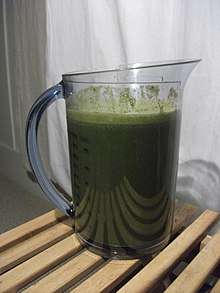Juice fasting
Juice fasting, also known as juice cleansing, is a fad diet in which a person consumes only fruit and vegetable juices while abstaining from solid food consumption. It is used for detoxification, an alternative medicine treatment, and is often part of detox diets. The diet can typically last for two to seven days and involve a number of fruits and vegetables and even spices that are not among the juices typically sold or consumed in the average Western diet. The diet is sometimes promoted with implausible and unsubstantiated claims about its health benefits.[1]

History
Juice fasting was popularized in America by Jay Kordich.[2]
Criticisms
Health claims in regard to juice fasting are not supported by scientific evidence.[2][3][4]
Catherine Collins, chief dietician of St George's Hospital Medical School in London, England, states that: "The concept of ‘detox’ is a marketing myth rather than a physiological entity. The idea that an avalanche of vitamins, minerals, and laxatives taken over a 2 to 7 day period can have a long-lasting benefit for the body is also a marketing myth."[5]
Detox diets, depending on the type and duration, are potentially dangerous and can cause various health problems including muscle loss and an unhealthy regaining of fat after the detox ends.[6] A review in The Gale Encyclopedia of Diets, has noted potential risks of juice fasting:
The major risks to health from juice fasts include metabolic crises in patients with undiagnosed diabetes or hypoglycemia; dizziness or fainting due to sudden lowering of blood pressure; diarrhea, which may result in dehydration and an imbalance of electrolytes in the body; and protein or calcium deficiencies from unsupervised long-term juice fasts.[3]
Juice mixes containing grapefruit juice may adversely interact with some prescription drugs.[7]
See also
- List of diets
- List of ineffective cancer treatments
- Fat, Sick and Nearly Dead
- Fruitarianism
- Juicing
- Juicer
References
- Valliant, Melissa. "Do Juice Cleanses Work? 10 Truths About The Fad". www.huffingtonpost.ca. Huffington Post. Retrieved February 2, 2019.
- Barrett, Stephen; Herbert, Victor. (1994). The Vitamin Pushers: How the "Health Food" Industry is Selling America a Bill of Goods. Prometheus Books. pp. 161-162. ISBN 0-87975-909-7
- Frey, Rebecca J. (2008). Juice fasts. In Jacqueline L. Longe. The Gale Encyclopedia of Diets: A Guide to Health and Nutrition. The Gale Group. p. 594. ISBN 978-1-4144-2991-5
- "Juicing -- Fad or Fab?". Retrieved 22 December 2019. "No published research currently supports the safety or efficacy of juice cleanses or fasts".
- "Debunking detox". www.SenseAboutScience.com. Archived from the original on April 18, 2014. Retrieved February 2, 2019.
- Zelman, Kathleen. "The Truth About Detox Diets". www.WebMD.com. Retrieved February 2, 2019.
- Mihn Chau, Vu. "Grapefruit Juice and Some Oral Drugs: A Bitter Combination". Escholarship.org. University of California. Retrieved February 2, 2019.
